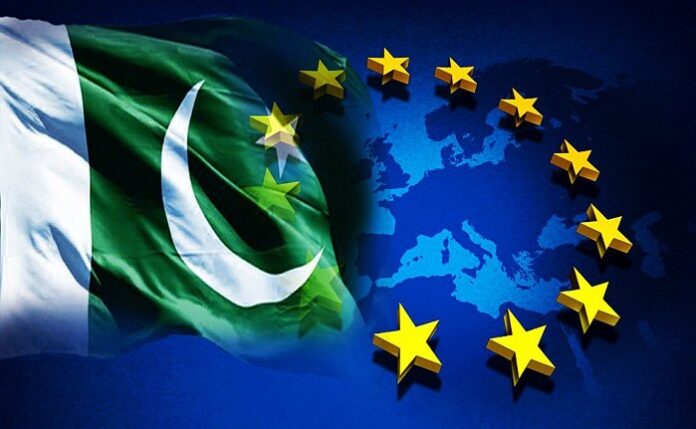ISLAMABAD: Members of the European Parliament (MEPs) have voted in favour of extending Pakistan’s Generalised System of Preferences (GSP) status, along with other developing countries, for an additional four years, maintaining it until the year 2027.
Dr. Gohar Ejaz, Federal Minister of Commerce and Industry, broke the news via Twitter on Thursday, expressing his satisfaction with the MEPs’ decision to continue the Generalised Scheme of Preferences (GSP) until 2027. He also highlighted that the European Council is expected to grant final approval for this extension in the near future.
The Generalised Scheme of Preferences (GSP) is a trade arrangement that allows developing countries to pay lower or zero tariffs on their exports to developed countries. The scheme has been in place since 1971. For countries meeting specific economic vulnerability criteria and ratifying and implementing 27 international conventions on human and labour rights, environmental standards, and good governance, the EU entirely waives customs duties on select products. This policy covers over 60 countries and benefits around two billion people.
The aim of GSP programs is to promote economic development in these developing nations by providing them with improved access to international markets. For Pakistan, the GSP+ arrangement provides generous tariff preferences, primarily involving zero duties on approximately two-thirds of product categories. It aims to promote sustainable development and good governance.
MEPs are individuals elected by the citizens of the European Union member states to represent them in the European Parliament, which is one of the EU’s legislative bodies. The matter of Pakistan’s GSP status extension had been deliberated upon by the European Parliament’s Committee on International Trade (INTA). The extension of these trade privileges, which offer Pakistan preferential access to EU markets, still awaits the approval of the European Council.
Pakistan remained hopeful about the outcome, as no objections emerged within the EU committee during the scheduled meetings on September 18th and 19th.
In his tweet, Dr. Ejaz underscored Pakistan’s commitment to the GSP scheme, emphasising its role in advancing the well-being of all involved parties. He extended his gratitude to the EU Parliament for honouring its commitment to facilitating trade from developing nations.
While the proposal to extend Pakistan’s GSP status may seem straightforward, it is vital to note that Pakistan’s continuation under the GSP+ arrangement is subject to regular reviews conducted by the EU, occurring every two years. The findings of the most recent review remain undisclosed, introducing an element of uncertainty into Pakistan’s hopes for an extension.
Pakistan has actively campaigned for the continuation of the GSP scheme and has taken substantial steps to align with the EU’s requirements. These efforts encompass ratifying and effectively implementing 27 core international conventions that focus on human and labour rights, environmental protection, and good governance.
Trade relations between the EU and Pakistan have shown significant growth in recent years. In 2022, bilateral trade between the two reached $14.857 billion, with Pakistan’s exports totaling $9.865 billion—a substantial increase from $6.639 billion in the previous year. EU exports to Pakistan amounted to $5.392 billion in 2022, a slight decrease compared to $5.544 billion in 2021.
Notably, Pakistan’s primary exports to the EU include textile articles, clothing, cotton, beverages, cereals, leather goods, and various other products. The extension of the GSP status until 2027 is poised to further strengthen trade ties between Pakistan and the European Union, fostering economic growth and development for both parties.
EU Statement:
While it is an important development in the context of Pakistan’s exports, it is important to know that the European Parliament has officially extended the existing rules aimed at reducing import duties from over 60 developing countries until 2027.
During a parliamentary vote, 561 MEPs voted in favour, while only 5 voted against, with 2 abstentions. This extension pertains to the current rules governing the scheme of GSP, as negotiations on new rules were paused in June due to differences between the Parliament and the Council of member states. The extension grants more time for the European Parliament and member states to reach an agreement on the new rules.
Rapporteur Heidi Hautala, a member of the parliament, emphasised the importance of this extension. “By dealing swiftly and efficiently with this prolongation and rollover, the Parliament underlines that it will not let beneficiaries down,” she said during the plenary session. Hautala pointed out that the extension was necessary to prevent socio-economic disruptions for beneficiary countries and companies.
However, Hautala noted that this rollover was an unfortunate consequence of the inability to reach an agreement between the Council and Parliament on the ongoing review of the GSP regulation. Outstanding issues include the Council’s desire to link tariff preferences to readmission obligations and safeguarding rice producers without creating excessive trade barriers.
In an interaction on X (formerly twitter), Dr Riina Kionka, the Ambassador and Head of the Delegation of the European Union to Pakistan, clarified that this rollover is approved so as to avoid a cliff edge at the end of 2023. She said that it had nothing to do with Pakistan’s or any other beneficiary’s performance.
























